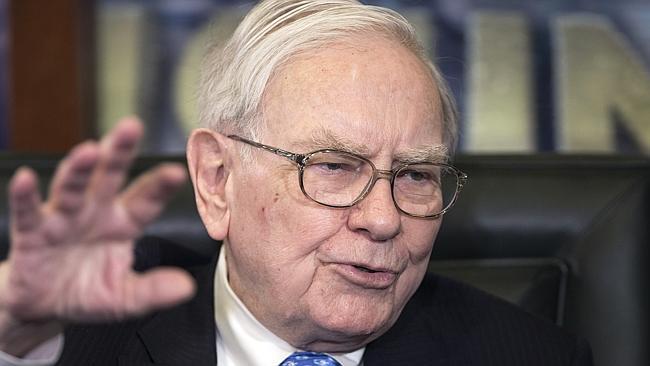Buffett’s still got it, despite fall
IS Berkshire Hathaway a victim of its own success?

IS Berkshire Hathaway a victim of its own success?
Warren Buffett’s recently published letter to shareholders was, as always, an informative and interesting read for Berkshire Hathaway shareholders and non-shareholders alike.
There are a few interesting aspects to this year’s letter, particularly Berkshire Hathaway’s track record of growth in per-share book value. For the first time, its growth has underperformed the S&P 500 index over a five-year period, and it is worth thinking about what, if anything, this tells us.
Berkshire Hathaway’s long-term track record is extraordinary: $US1 invested in 1965 (when current management took over) would have grown to more than $US6000 today, compared with about $US100 if it had been invested in the S&P 500. This phenomenal result reflects the benefits of compounding over many years at a good rate of return (in this case, close to 20 per cent per annum for Berkshire versus about 10 per cent for the index).
Another point to note is that Berkshire’s track record is measured in terms of book value per share, rather than market value (as is the case for the S&P 500). Book value is a more stable metric than market value, and it follows that when the S&P 500 rises strongly, Berkshire is likely to fare less well, and when the S&P 500 “falls out of bed”, the comparison will probably favour Berkshire.
Returning to the recent underperformance, there are a few possible explanations. One possibility is that the past five years have been a strong period for the S&P 500, and we should expect Berkshire to lag. The past five years incorporate the market recovery post the global financial crisis and the returns from the S&P 500 have been well above historical averages. The previous five years (including the crisis) were relatively grim.
To address this, we have looked at a longer-term performance comparison showing Berkshire’s average outperformance over rolling 10-year periods. The results are shown below.
The chart shows that, over 10-year periods, Berkshire has always beaten the market. However, the level of outperformance appears to be steadily declining over time. The most recent 10-year period is the worst to date. In this light, the most recent five years appears to be part of a continuing trend, rather than a statistical anomaly.
The first thing that comes to mind in explaining this decline is the sheer size of Berkshire. With close to $US500 billion ($553bn) in total assets, Berkshire has become a huge organisation, and Buffett has made clear over the years that returns must decline with the size of the group. There are simply not enough attractive opportunities big enough to “move the needle” on an enterprise as big as this.
Is there more to the observed decline than size? Certainly, recent performance appears low and we might ask whether Buffet’s legendary investment skill has as much value as it did previously.
One factor that might support this view is that, for each of the past two years, Buffett’s potential successors Todd Combs and Ted Weschler have delivered better returns from their listed investment portfolios than Buffett has from his. However, it may just be that Combs and Weschler are less-conservative investors, and a full cycle is needed to make a fair comparison.
In the coming years we may gather more information that will allow us to better gauge whether Buffet’s investment magic is still intact. In the meantime, for my part, I think that deep insight, common sense and patience will always be valuable attributes in an investor, and reading Buffett’s letter leaves me in no doubt that he still has these in good measure.
Roger Montgomery is the founder of Montgomery Investment Management.
Warren Buffet’s 2014 letter to shareholders was published recently. As always, it is an informative and interesting read for Berkshire Hathaway shareholders and non-shareholders alike. Buffet’s ability to communicate clearly and frankly on a wide range of topics is something to savour.
There are a few interesting aspects to this year’s letter. One that I wanted to focus some time on is Berkshire Hathaway’s track record of growth in per-share book value. For the first time ever, Berkshire Hathaway’s growth has underperformed the S & P500 over a five-year period, and it is worth thinking about what — if anything — this tells us.
Firstly, some background facts. Berkshire Hathaway’s long-term track record is extraordinary: $1 invested in 1965 (when current management took over) would have grown to more than $6,000 today, compared with around $100 if it had been invested in the S & P500. This phenomenal result reflects the benefits of compounding over many years at a good rate of return (in this case close to 20% p.a. for Berkshire vs. ~10% p.a. for the index). If you take just one thing from this article, let it be the magic of compounding a good return over long time frames. It is because of this that cash tends to provide a generally unsatisfactory long-term investment outcome, despite its short-term advantages in times of trouble.
Another point to note is that Berkshire’s track record is measured in terms of book value per share, rather than market value (as is the case for the S & P500). Book value is a more stable metric than market value, and it follows that when the S & P500 rises strongly, Berkshire is likely to fare less well, and when the S & P500 “falls out of bed”, the comparison will likely favour Berkshire.
Returning to the recent underperformance, there are a few possible explanations for what has happened, and what it might mean for the future.
One possibility is that the past 5 years have been a strong period for the S & P500, and we should expect Berkshire to lag. There is some truth in this. The last five years incorporates the market recovery post the GFC, and, the returns from the S & P500 have been well above historical averages. The previous 5 years (including the GFC) were relatively grim.
To address this, we have looked at a longer-term performance comparison showing Berkshire’s average outperformance over rolling ten year periods. The results are shown below:
The chart shows that over ten year periods Berkshire has always beaten the market. However, the level of outperformance appears to be steadily declining over time. The most recent ten year period is the worst to date. In this light, the most recent 5 years appears to be part of a continuing trend, rather than a statistical anomaly.
The first thing that comes to mind in explaining this decline is the sheer size of Berkshire. With close to $500B in total assets, Berkshire has grown to become a huge organisation, and Buffet has made clear over the years that returns must decline with the size of the group. There are simply not enough attractive opportunities big enough to “move the needle” on an enterprise as big as this.
This point, by the way, applies to all investors and to fund managers. If you choose your investment managers based on how large and well-known they are, you may be looking at the wrong thing.
Accepting that size is a factor, is there more to the observed decline than that? Certainly the recent performance appears quite low and we might ask whether Buffet’s legendary investment skill has as much value as it did previously.
One factor that might support this view is that for each of the last 2 years, both of Buffet’s potential successors, Todd Combs and Ted Weschler have delivered better returns from their listed investment portfolios than Buffet has from his. However, we should probably not read too much into two years of results. It may be that Todd and Ted are less conservative investors, and a full cycle is needed to make a fair comparison.
In the coming years we may gather more information that will allow us to better gauge whether Buffet’s investment magic is still intact. For the time being, however, we probably need to rely on our judgement. For my part, I think that deep insight, common sense and patience will always be valuable attributes in an investor, and reading Buffet’s letter leaves me in no doubt that he still has these in good measure.
Roger Montgomery is the founder of Montgomery Investment Management.



